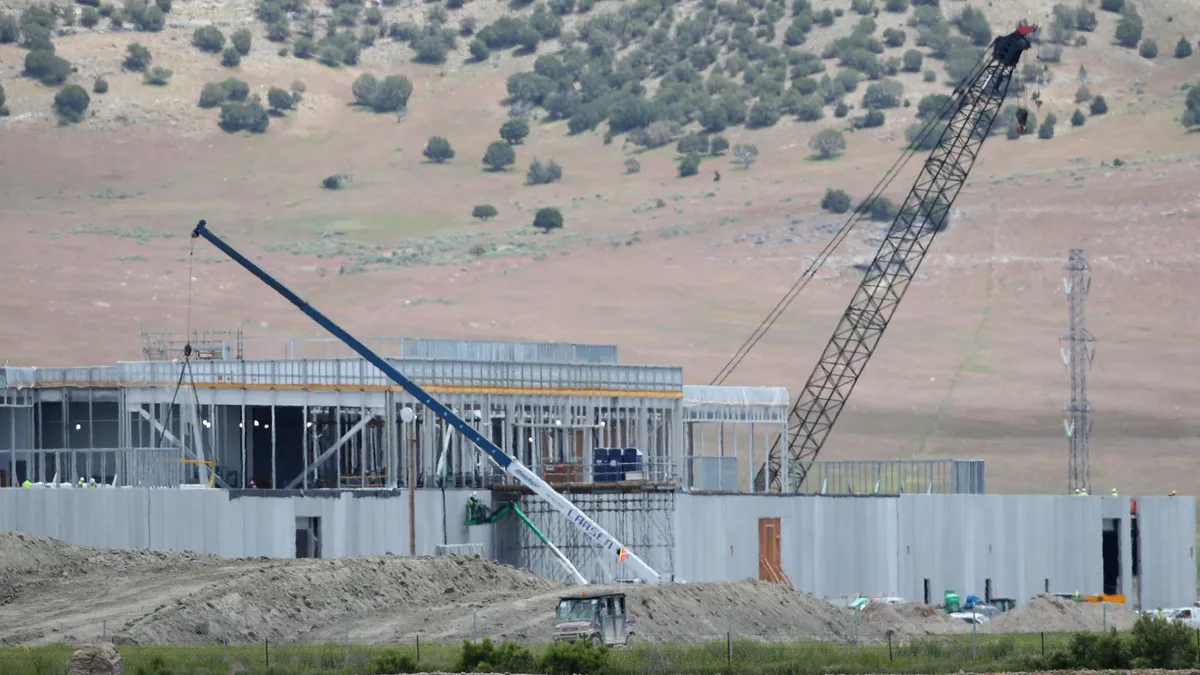Dive Brief:
- Turner Construction and Meta kept a massive data center construction jobsite idle in Nebraska for a third day Wednesday after two consecutive incidents of racist graffiti were discovered on the project last week.
- Workers discovered an initial racial missive at the sprawling, $1.5 billion construction complex in Sarpy County, Nebraska, south of Omaha, on Wednesday, Sept. 14. Turner held an initial stand down with workers to address the issue the next day.
- But on Friday, after Turner had emphasized its zero tolerance policy for hate on its jobsites, a new racial epithet was found in an area that had previously been cleared as free of graffiti.
Dive Insight:
“We do regular inspections across our projects, and we’re confident Friday’s graffiti was new,” Christopher McFadden, Turner vice president and spokesperson, told Construction Dive. “So the decision was made with Meta and with principals and trade partners to pause and do a bit of a reset on the path forward here.”
Turner has been outspoken against hate as numerous racist displays have appeared on construction sites nationally in recent years. Turner shut down other Meta jobsites in 2020 in Ohio and Iowa, when similarly racist epithets, as well as a noose, were found.
The new graffiti is at least the fifth racist incident at a Meta construction site — including a noose found earlier this summer at a Redmond, Washington project that had a Black worker’s name taped to it — and one of several where Turner has stopped work on its projects in response.
When asked why the incidents keep happening on Meta and Turner sites, McFadden said the problem occurs regularly throughout the industry, but that some contractors and clients may not be as candid in addressing it.
“What Turner and Meta and others working on the Meta projects have committed to is speaking up and taking actions when we see something,” McFadden said. “I’m not confident that’s universal at this point, others may choose to deal with it differently. But we, collectively, have chosen to take very public action.”
Meta told Construction Dive it is being proactive with its construction vendors to address the issue.
“While this is a challenge facing the entire industry, we’re working with our general contractors to implement measures that will help prevent them at any of our construction sites,” said Melanie Roe, Meta spokesperson, in an email. “At the Sarpy County site, we are working closely with Turner Construction and trade leaders to identify the perpetrators of these acts.”
McFadden said Turner notified local law enforcement of the incident, but couldn’t confirm whether a reward was being offered in the case. At a Meta construction site in Utah, where M.A. Mortenson was the general contractor, a $100,000 reward ultimately resulted in a worker being fired from the job.
An anti-racism ‘playbook’
In a move that shows how widespread these racist incidents are in construction, Meta said it is developing a playbook on how to respond to such events, in partnership with the contractors who build its data centers in the U.S. The document includes guidance on what to do when an incident occurs, including site preservation and notifications. It also requires GCs to designate a diversity, equity and inclusion contact person.
Meta said it is also requiring all of its data center general contractors to sign contracts that require them to maintain a workplace free of harassment and discrimination, and to report incidents when they occur.
The company said its contractors implement anonymous reporting channels at all of its jobsites.
McFadden said Turner had shared with Meta its own anti-bias toolkit, a copy of which was emailed to Construction Dive. He said the company has made unbranded copies of anti-hate videos and jobsite posters available to its trade partners, as well.
Despite these efforts, racist incidents continue to plague the construction industry. This latest occurrence came as the sector prepares for its second annual Construction Inclusion Week Oct. 17-22, which was started by Turner and five other large contractors to promote a more tolerant culture on jobsites.
McFadden couldn’t quantify the daily cost of the job being shut down, or when work would start again. But he said the work stoppage helps draw attention to the company’s attitude toward these acts.
“There’s an individual or two who are acting in a way that’s counter to the culture we want on our jobs,” McFadden said. “It’s hard to say what motivates someone to act in such a way and put at risk their future ability to provide for themselves and their families.”
The project is scheduled for completion by the end of 2024.















